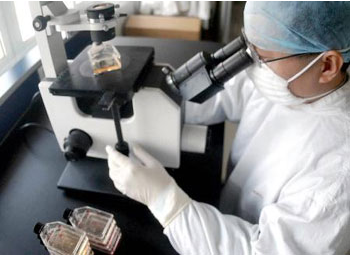
A drug used to treat AIDS-triggered lung infections may prevent the reproduction of HIV and possibly provide a new method for the control and elimination of the virus, Chinese scientists said Thursday.
近日,中国科学家指出,一种用来治疗艾滋病触发性肺部感染的药可能可以阻止艾滋病病毒的繁殖,并且可能提供一种新的控制和消除艾滋病病毒的方法。
A research team led by Shen Binghui, a life science professor at Zhejiang University, found that a drug containing pentamidine can cut the life cycle of HIV and prevent the reproduction of the virus, helping the body's immune system and fight off AIDS.
由浙江大学生命科学教授沈炳辉领导的研究小组发现,一种含有戊烷脒的药能够减短艾滋病病毒的生命周期并且能够阻止这种病毒的繁殖,有助于帮助免疫系统对抗艾滋病。
HIV has an incubation period of 10 years on average, during which the virus infects immune cells and uses the cells and proteins to reproduce and spread, gradually damaging the immune system. Research indicates that a kind of human protein called FEN-1 has a decisive function in the reproductive process of HIV.
艾滋病病毒的潜伏期平均为10年,在这期间,艾滋病病毒会感染人的免疫细胞并利用这些细胞和蛋白质进行繁殖和传播,慢慢地破坏整个免疫系统。研究表明,一种名为FEN-1的蛋白质在艾滋病病毒的繁殖过程中起决定性作用。
Shen said his team found that the drug can prevent the reproduction of HIV by destroying the protein. The virus can no longer damage the immune system once it cannot reproduce, and a small amount of HIV can even be eliminated by a healthy immune system.
沈炳辉说他的研究小组发现这种药能够通过破坏FEN-1蛋白质从而阻止艾滋病病毒的繁殖。一旦艾滋病病毒不能繁殖,它们也就无法破坏人的免疫系统,而少量的艾滋病病毒是可以被一个健全的免疫系统所消灭的。
Shen said the drug that his team is developing can greatly lower treatment costs.
沈炳辉还指出他们研究小组正在研发的药能够在大大地降低治疗费。


